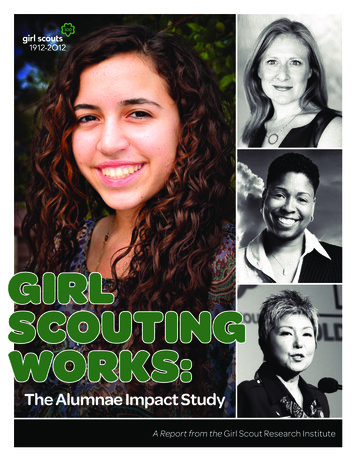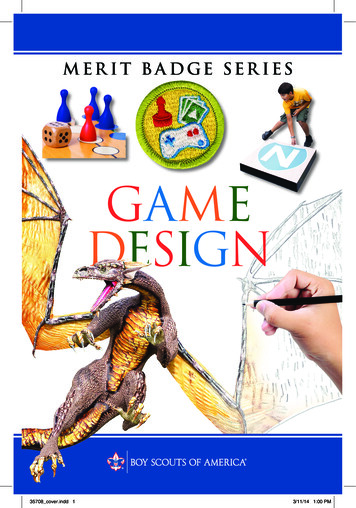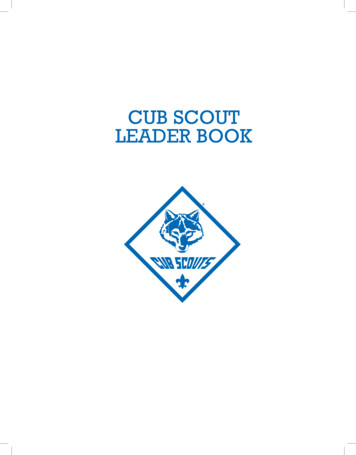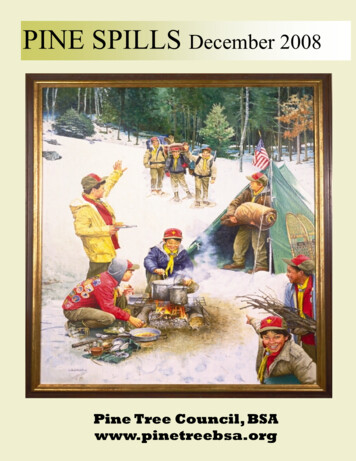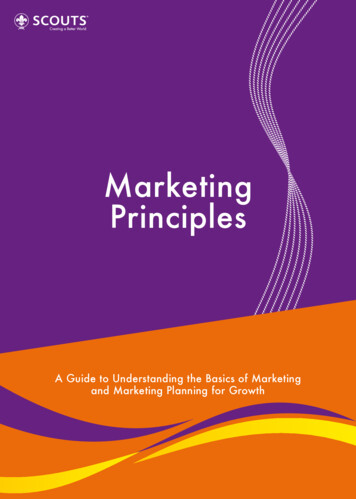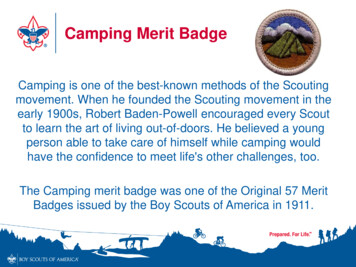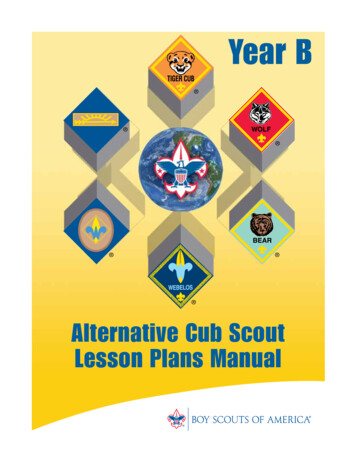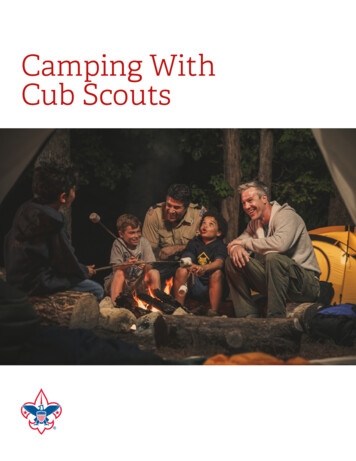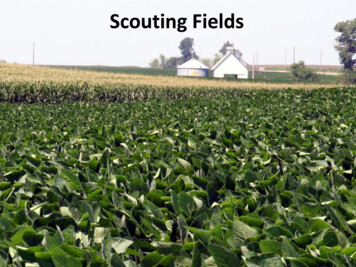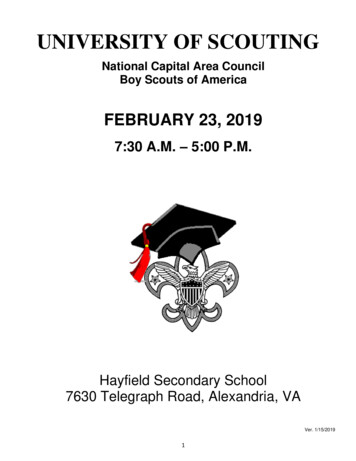
Transcription
UNIVERSITY OF SCOUTINGNational Capital Area CouncilBoy Scouts of AmericaFEBRUARY 23, 20197:30 A.M. – 5:00 P.M.Hayfield Secondary School7630 Telegraph Road, Alexandria, VAVer. 1/15/20191
TABLE OF CONTENTSGENERAL INFORMATION . . .3THE DEGREE PROCESS . . . . .6LOCATION . . . .7COLLEGE OF CUB SCOUTING . . .8COLLEGE OF SCOUTS BSA . . . . .15COLLEGE OF ADVENTURE SCOUTING . . . . .21COLLEGE OF ELECTIVE PROGRAMS . . . . .28COLLEGE OF DISTRICT OPERATIONS . . .332019 COMPLETE COURSE SCHEDULES . . . . . 37REGISTRATION INFORMATION . . . . 382
WEAR YOUR UNIFORMGENERAL INFORMATIONPurpose of the University of Scouting – The “University of Scouting” is a supplemental trainingopportunity for all adult Scout leaders. It is the only time during the year where you can find, all in oneplace, the widest variety of training opportunities in all program areas (Cub Scouts, Scouts BSA,Venturing, Sea Scouting, District Operations, and Council). Whether you are new to the program or aveteran of many years, the University provides interesting courses in Cubbing, Scouts, and Adventureand leadership training for Venturing, and Sea Scouting; Electives courses applicable across theScouting programs, and District operations courses. The College of Cub Scouting provides a wide variety of courses from working with Cub Scoutaged boys to pack administration to planning for an outdoor program, all focused on meetingScouting goals while having fun as a pack or den. The College of Scouts BSA provides an exciting variety of troop, patrol and outdoor planningsupplemental courses to help manage the challenges of a great troop experience. The College of Adventure Scouting is an interesting combination of courses for those who wishto learn more about Scouting’s “senior” programs (Venturing, Sea Scouting, and Exploring) andresources and information on a variety of adventure and high adventure activities. The College of Elective Programs offers many “general studies courses” that cut across all theprograms. Just about everything from diversity and special needs to using technology can befound in the Elective Programs. STEM Scouts will be covered as a subprogram (ELC500classes) within the Electives College. The College of District Operations is intended to provide training to district committee membersand Scouters with an interest in district operations. While no degrees are conferred in thisCollege, those who complete the three-period DOT101 are awarded the District ScouterTraining Certificate and are entitled to wear the “Trained” patch. Standalone Courses are those that are BSA national syllabus courses such as ILSC(Y) andILSC(A), that lead to certification recognized and/or needed by the BSA. Note that standalonecourses do not meet any degree requirements in any College. Family Scouting. Gary Schroeder, National Pilots Chairman, will present a detailed description of themany opportunities, and some of the risks, of the new Family Scouting program (Course ELC100). Thephilosophy and background behind the initiation of Family Scouting will be presented serving as afoundation for understanding how we will create a new Scouting future that successfully serves bothboys and girls.All these opportunities are available at the University for learning how to better serve our youngpeople and better work with our fellow leaders!3
Online Registration – Online registration is available after January 8 at ncacbsa.org/uos and willclose at midnight Sunday, February 17, 2019. Mail-in (paper) registrations will not be accepted. Thereare three registration categories at the UoS. Students and others taking classes. Fee 40.00 Instructors and Staff taking classes. Fee 40.00. Instructors and Staff not taking classes. Fee 25.00.Pre-Registration is important – The anticipated large attendance requires advance scheduling. Toensure the best possibility of attending your desired courses, early registration is essential. Classesdo sell out. Additional details on registration are provided on pages 40-41.Onsite Registration/Walk-ins – Registration will reopen at 7:30 am onsite at Hayfield HighSchool. Those registering onsite will be charged the full 60.00 registration fee and will receivecourse assignments based on availability of space in the classes. Classes will be assigned on a firstcome, first served, basis until classes are full. Due to time constraints, those registering onsite maybe unable to complete registration in time to attend a course scheduled for the first period. For thesereasons, ONSITE REGISTRATION THE MORNING OF THE UNIVERSITY IS HIGHLYDISCOURAGED! Save 20.00 by pre-registering by February 17, 2019.Included with Registration – The per person registration fee includes attendance at sixUniversity of Scouting courses, a patch, morning refreshments, lunch, certificate of attendance and/orother forms of recognition as appropriate, liability insurance recovery, and administrative costs.Opening and Closing Assemblies – In the morning and afternoon, assemblies will be conductedand are open to all participants. Short welcoming and inspirational messages, pertinent information,and other last-minute details will be available in the morning assembly. We urge everyone to stay forthe closing assembly and to help us celebrate the dedication of your peers receiving doctoral degreesfor each college. We also recognize an outstanding “Trainer” with the 2019 Grafton Award.Class Schedules, Patches, Diplomas, and Certificates – An information packet for preregistered participants must be picked up at the Registration Area when you arrive. In this informationpacket you will find a personalized class schedule (including room assignments), a school map, yourlunch ticket, and the 2019 University of Scouting patch. Also enclosed will be your attendancecertificates and/or Bachelor of Scouting or Master of Scouting degree diplomas. Registration staff willbe available in the Registration Area to resolve and print incorrect or missing diplomas andcertificates.College Deans and University Staff/Instructors – Pickup registration materials in theRegistration Area as above. Then proceed to your college office to sign-in and pick up handouts foryour class.Certifications and Credit for BSA Classes – Certifications and credit for standalone and officialBSA training courses will be handled by the instructors of those courses.Event Cancellation/Refund Policy – In case of inclement weather, a decision to cancel theUniversity of Scouting will be made prior to 8:00pm Friday, February 22nd. This information will beavailable on the NCAC website (http://www.ncacbsa.org) or by phoning (301) 214-9188 after 8:00pmFriday. If the University is canceled, you may choose to obtain a partial refund by submitting a writtenrequest to NCAC prior to March 16, 2019. The amount of the refund will be determined afteradministrative costs and encumbered expenses are paid. Refunds will be mailed by the end of March.4
Scouting Museum – A scouting museum will be set up in the lobby near the registration area andin front of the auditorium. We expect to have a large volume and variety of scouting memorabilia ofinterest displayed by dedicated collectors of scouting artifacts. Please stop by!Trading Post – A Trading Post will be available inside the cafeteria prior to opening ceremonies,throughout the morning, and during lunch for purchases of BSA literature, including most “in print”material referenced in University of Scouting courses. The Trading Post will close at 2:00 pmLunch is included – Lunch will be available in the school cafeteria during the Lunch Period(12:00 noon – 1:00 pm) for all participants and staff.Carpool – Parking at Hayfield Secondary School can be a problem for those arriving after8:30 am. Carpooling is encouraged to conserve resources and save those late arriving a long walkfrom where they park to the school. A Scout is Thrifty!Basic Schedule – A personal schedule specific to each participant will be provided at check-in forpre-registered attendees and after onsite registration for those registering onsite. 7:30 am - 8:15 amo Check-in/Onsite Registration – Main Lobbyo Morning Refreshments - Cafeteria 8:15 am - 9:00 am Opening Ceremony – Auditorium 9:10 am – 12:00 noon UOS Courses (Check personal schedule for specific course times) 12:00 noon - 1:00 pm Lunch – School Cafeteria 1:10 pm – 4:00 pm UOS Courses (Check personal schedule for specific course times) 4:10 pm - 5:00 pm Closing Ceremony – School CafeteriaThe Scoutshop will be open until 2:00 pmThe Museum and Midway will be open until 3:10 pm5
THE DEGREE PROCESSGeneral Degree Guidelines A scouter who attends the University of Scouting is strongly encouraged to pursue a degree. You maytake courses from any College at any level and from the list of Elective courses. To attain a degree inone of the Colleges, however, the requirements outlined below must be met. Note: no degrees areconferred by the College of District Operations or the College of Electives. The course levels (Level 100, Level 200, etc.) of all Colleges are shown to identify the complexity of thecourse. Generally, we recommend that students take Level 100 courses before Level 200 courses andLevel 300 courses before Level 400 courses, etc. because courses are logically more sophisticated,progressive and/or specialized as the level increases. However, we leave it to each scouter todetermine what courses to take at any level. Coursework may not be credited towards more than onedegree at the same time. The College Dean is the approving authority for conferring degrees. Please contact the Dean if thereare any questions on degree requirements.Bachelors Degree: To earn a Bachelors degree in a College, do all the following: Complete six courses at any course level At least three of these courses must be in the College from which the degree is sought (Cub Scouting,Scouts BSA, Adventure Scouting). The remaining three courses may be from any College (includingthe Electives or District Operations College).Masters Degree: To earn a Masters degree in a College, do all the following: Hold a Bachelors degree in that same College. Complete six additional courses (for a total of 12 courses) at any course level. All six of these additional courses must be different from those completed for the Bachelors Degree. At least three of these additional courses must be in the same College as the Bachelors degree. Theremaining three courses may be from any College (including the Electives or District OperationsCollege).Doctorate Degree: To earn a Doctorate degree in a College, do all the following: Hold a Masters degree in that same College. Complete six additional courses (for a total of 18 courses) at any course level. All six of these additional courses must be different from those completed for the Bachelors andMasters degrees. At least three of these additional courses must be in the same College as the Bachelors and Mastersdegrees. The remaining three courses may be from any College (including the Electives or DistrictOperations College). Upon completion of the above coursework, serve in a teaching role in the College at the discretion ofthe Dean of that College. NOTE: It is the responsibility of a Doctoral candidate to contact their Deanpersonally immediately following the completion of the coursework and no later than September 30th,2019 to be added into the teaching plans for the next University of Scouting. No exceptions.Deans: Provost, 2019 NCAC University of Scouting: Jon Baake – jbaake@md.outlook.com College of Cub Scouting: Roger Claff – reclaff@aol.com College of Scouts BSA: Melanie Anthony – melaroonie24@comcast.net College of Adventure Scouting: Adair Petty – ppetty1@cox.net College of Elective Programs: Joseph Grant – joseph grant@msn.com College of District Operations: Bob Owen - scouterbobowen@msn.com6
LOCATIONHayfield Secondary School7630 Telegraph RoadAlexandria, VA 22315http://www.fcps.edu/HayfieldSS/Parking can be a problem for those arriving late. Carpooling is highly encouraged toconserve resources!(A Scout is Thrifty)HAVE EACH LEADER IN YOUR UNIT ATTEND SEPARATE COURSES!SHARE INFORMATION!7
COLLEGE OF CUB SCOUTING2019 NCAC University of ScoutingWelcome to the College of Cub Scouting Science! Before you read the Cub College course listings, we’dlike to explain a little bit about the nature and perspective of Cub College courses, because they are a littledifferent than the supplemental training classes you might have taken at other training venues.The National Capital Area Council offers two annual Council-wide supplemental training events open to allCub Scout leaders – Pow Wow in November and University of Scouting in February. The Council Pow Wowoffers a vast variety of classes spanning the full spectrum of the Cub Scout program and its operations. PowWow presents these classes from a mechanical perspective, in that its focus is to give you the immediate“how-to” practical knowledge necessary for running meaningful, successful, fun and exciting den and packmeetings and outings, while making the best and most efficient use of your time, talents, and energies.The University of Scouting Cub College differs from Pow Wow in that it has not a mechanical, but aphilosophical perspective. To appreciate this philosophical perspective, think of the Cub College as akin to anexperienced hiker taking periodic compass bearings in the woods. He might have all of the right gear in hispack, he might have acquired all of the knowledge needed to hike and camp in the woods, his walkingtechniques might be optimized to conserve energy, but none of that really matters if he is walking in the wrongdirection. In Cub College classes, we offer insight into the direction of your “travels” through the Cub Scoutprogram. What are you as a Den Leader, a Cubmaster, or a Committee Member, trying to achieve in thescouts in your charge? How can you understand your growing scouts as they advance in rank, so you canmeet their needs? How have others tailored their Cub programs to meet scouting’s overall goals andobjectives? How do you know when your program is succeeding, or when you need adjustments to make theCub Scouting experience better and more meaningful? Answers to these questions – and many more – canbe found here in the Cub College!In addition to these Council-wide events, Districts offer monthly Cub Scout Leader Roundtables as well asmore specific, targeted training sessions such as BALOO, in addition to Cub Scout Leader-Specific Training.You, the Cub Scout leader, should take advantage of all training options available to you – they offer youimmediate help, answers to questions, ideas, additional capabilities, and a broadening perspective.So again, welcome! Please read over the course descriptions, select those classes of most value andinterest to you, and we look forward to seeing you at the University!Roger Claff, DeanBill Mayo, Associate Dean8
COLLEGE OF CUB SCOUTING2019 NCAC University of ScoutingCOURSE LISTINGS100-level courses in the Cub College are fundamental courses addressing the nature of the Cub Scout,and Cub Scout den and pack programs. These courses provide information useful to all Cub Scout leadersregardless of experience.200-level courses address more specialized topics providing guidance and context for Cubmasters andCommittee Members as well as Den Leaders and expound further on topics initially addressed in 100-levelcourses.300-level courses concern management of the pack program to meet Cub Scout objectives, and theevolution of Cub Scouting principles.400-level courses focus on quality trained leadership and program evaluation to provide the best possibleCub Scout experience.The levels are not intended to literally correspond to a registrant’s year of attendance in the Cub College,but rather to provide general guidance as to likely interest based on a Cub Scouter’s current position and levelof experience. For all Cub Scouters new to the Cub College, we strongly recommend you consider taking thecourses CUB100 and CUB101 in your first year. These courses will give you an excellent working knowledgeof not only the Cub Scout program but also working with Cub Scout-age youth.LEVEL 100 COURSESCUB100The Cub Scout Within You: Come rediscover the Cub Scout in you and allow yourself to havefun as a leader. Learn why you should become a Scouting evangelist and how to summon thecreative powers within you – all to make a difference in the life of a boy or girl andyourself. Please be prepared to “check” your adult self at the door!CUB101Through the Eyes of Youth – the Perspective of a Growing Cub Scout: This course takes anin-depth look at youth, with the aim of building a better program through an increased awarenessof characteristics, motivators, interests, and needs. We will talk about their sense of explorationand discovery, their love of adventure and excitement, and their desire for recognition. Thiscourse is for all leaders who work directly with youth.CUB102Lions and Tigers, Oh My! – An Orientation for Den Leaders and Adult Partners:With the inclusion of Lions as an official Cub Scout program, and with c hanges to theTiger program over the years, many leaders are confused about how to use the Lion andTiger programs in their packs. Without new Lions and Tigers, along with their adult partners,entering packs, packs will not grow. Come find out how to use Lions and Tigers as anexciting start for young scouts along the scouting trail, and as the motivating to ol for longterm Cub Scouting participation.CUB104Recruiting and Retaining Cub Scout Leaders: Recruiting and retaining Cub Scout Leaders isvital to improving the quality and diversity of the program. Yet recruiting new leaders andretaining good leaders from year to year are more challenging than ever before. This course willoffer useful recruiting ideas and techniques for finding potential leadership talent within your pack,and how best to approach and cultivate potential volunteers. The course will also discussretention of quality adult leadership, including the importance of communicating, recognizing andrewarding successful adult leaders in the pack as the pack’s most vital program implementationresource. The course will establish the relationship between Cub Scout leader recruitment andretention and meeting the character, citizenship, and fitness goals of the Cub Scout program.9
CUB121Mistakes Packs Make and How to Avoid Them: Learning from mistakes is the only way togrow as a leader and as a pack. Come learn from the experiences of others to help you build andimprove upon your program at the pack or den level. We will talk through some of the commonleader missteps leaders and explore strategies for avoiding them.CUB125Den Leadership and Program Planning Principles: Advance planning in the key to success inany venture, including Cub Scouting. We'll discuss scheduling, organizing, planning andbudgeting den activities that support and build character, citizenship, and fitness; working inconcert with your pack’s program and aims; and helping your Scouts make progress toward rankadvancement; while everyone is having fun! We’ll cover how to work as a Scouting team withparents and families, how to put the “outing” in “Scouting,” and how to effectively share leadershipwith others to improve the quality of the den program.CUB129Duty to Country - Citizenship and Good Turns in Cub Scouting: From saluting the flag tovisiting battlefield parks and memorials, we will explore the importance of duty to country withinthe Cub Scout program. Learn how to incorporate a patriotism and citizenship program into yourCub Scout year in such a way that will allow for personal growth and discovery. Understandingthe link between citizenship and service to the community and seeing the Scouting “good turn” asa citizen’s act of patriotism, we will also cover preparing, planning, leading, and reflecting on CubScout service projects to enhance communities and help others in need.CUB133Family Involvement in Cub Scouting: Cub Scouting is a family-centered program, but whatdoes that really mean? At all ranks, Cub adventures include requirements to be met not in the denor pack but at home. Active and engaged parent participation boosts delivery of an effective CubScout program, promotes Scout retention and advancement, and reinforces Scouting goals andideals. We will cover the nature and extent of family participation and how to best encouragefamilies to become involved in dens and packs, while recognizing limitations and constraints.CUB135A-Hiking We Will Go – Cub Scout Hikes and Hiking: What would Cub Scouting be withouthikes? Let’s all go for a walk! Hikes bring adventure, challenge, exploration, discovery andinspiration. This course will discuss the different types of hikes Cub Scouts enjoy and relate thesehikes to the goals of scouting. Hikes should be selected and led with Cub Scout ages-and-stagesin mind, and safety is always the most important consideration. The course will detail how to planand prepare for hikes, policies and procedures to follow, medical forms and consent forms, gear,training, outdoor ethics, and more.CUB185The Den Chief Role Model: The very best role model for Cub Scouts is a Den Chief, because theCub Scout wants to become a BSA Scout just like him or her! Learn why and how the Den Chief isa vital resource to the Den Leader, as the Den Chief becomes a strong leader and the very bestrecruiter for his troop. We will discuss Den Chief roles and responsibilities, the role of the DenLeader as a mentor to the Den Chief, the responsibility of the troop to work as a partner with thepack in selecting Scouts for Den Chief service, common misconceptions about Den Chief service,and the importance of communication and training to provide the best possible experience for theDen Chief and for the den and troop in which he serves. This course will be co-taught byinstructors from the College of Cub Scouting and College of Scouts BSA. This course counts aseither College of Cub Scouting or College of Scouts BSA credit toward University of Scoutingdegrees.CUB192Worthy of Note – Cub Scout Songs and Singing: Cub Scouts and singing have always gonetogether! Singing builds pack and den spirit, makes everyone feel welcome, allows Cub Scouts tohave fun expressing themselves, and drives home Scouting virtues and camaraderie in ameaningful way. This course will explore both the fun and importance of singing in Cub Scouts,how to select the right song for the occasion, and how to lead a song with confidence even if yoursinging voice is not exactly pitch-perfect!10
CUB195The Webelos-to-Scout Transition: The Cub Scout program is an adult-leader led, family-andcommunity-centered program for youth in grades 1 through 5. The BSA Scout program is a Scoutled, outdoor-centered program for youth in grades 5 through 12 (note: Arrow of Light Scoutsgraduate to Scouts BSA while in 5th grade). The transition between these two programs is rarelyseamless, as Arrow of Light Scouts graduating into troops often face difficulty adjusting to theoutdoor camping experience, the imperfections of youth leadership, and the self-reliance andinitiative expected of them in pursuing their advancement. This course will examine both the adultled Webelos/Arrow of Light program and the boy-led BSA Scout program to provide ideas andrecommendations to best prepare the graduating Arrow of Light Scout, and his parents, for theupcoming adventure of BSA Scouting.LEVEL 200 COURSESCUB201Cub Scout Environmental Science and Conservation: A commitment to stewardship of ourenvironment is part of a Cub Scout’s duty to country and promise to help others. Come and learnhow to teach your Cub Scouts about conservation though proper management of naturalresources. Also find out about conservation and environmental recognitions, including theConservation Good Turn, World Conservation Award, Messenger of Peace, and Hornaday UnitAward, and how scouts in each of the Cub Scout ranks can earn them.CUB206Cub Scouting with Special Needs: This course will address how to deliver a safe, fun,meaningful, and exciting den and pack program for the Scout with special needs and his/her fellowScouts. Communication, understanding and patience are the keys to interactions and developingrelationships.CUB209The Committee - Roles and Responsibilities: Many packs do not have or may not understandthe importance of an active pack committee to fully support the unit’s Cub Scout program. Othersmay not clearly understand the distinction or linkage between pack committee and pack programfunctions. We will delve into the duties of the committee and the roles they play in supporting thedelivery of the Cub Scout program.CUB210The Committee – Resources: Packs need money to operate and grow - there’s Boys Life, recharter fees, insurance, Cub Scout advancement awards, leader awards and let’s not forget theannual Blue and Gold Banquet. We will discuss pack finances for the layman and why it isimportant to the quality of your program for your unit to be financially healthy. We will explorebudgeting, fundraising, account management, reporting, and planning and authorizingexpenditures.CUB211Character Development Through Cub Scouting: One of the main objectives of Cub Scouting ischaracter development. We will examine the nature and quality of good character and emphasizethe use of the virtues embedded in Scout Oath and Scout Law as a fundamental part of yourprogram in helping Scouts grow and learn.CUB212A Cub Scout’s Duty to God: A Cub Scout’s Duty to God is the motivation and guide for hischaracter development. We will consider why duty to God is a cornerstone of Scouting, anddiscuss ways to encourage duty to God through Scouting, including use of the Religious EmblemsProgram.CUB220Outdoor Ethics for Cub Scouts: From the very beginning, the Boy Scouts of America haspledged conservation and respect for the environment as an essential component of goodcitizenship. Today, as more and more people enjoy the benefits of our nation’s natural resources,additional pressure and urgency is brought to bear on outdoor ethics, to ensure our beautifulnatural spaces remain unspoiled not just for the current generation, but also future generations toenjoy. This course will cover outdoor ethics for Cub Scouts centered on the Outdoor Code and therelationship between outdoor ethics and Scouting’s goals. Front-country guidelines will be11
detailed, including conservation expectations, outdoor manners, and minimizing campsite wasteand trash.CUB231Creative and Captivating Campfire Planning: Campfires are a Scouting tradition as venerableScouting itself. Campfires should create life-long memories for your Scouts as they reflect on thefriendship of their fellow Scouts and become receptive to Scouting’s deeper meanings. We willcover how to make the most of the campfire experience, how to engage Scouts in campfire fun,how to plan the agenda to set the proper tone and tempo, campfire do’s and don’ts, and sourcesfor captivating story-telling and Cubmaster/Den Leader minutes.CUB240Recognizing the Achieving Cub Scout: Scouting, like life, is a meritocracy; when time, thought,effort and dedication are devoted to accomplishing a goal the right way, and that goal is thereforeachieved, recognition is inevitable, serving as a further motivator to the recipient and his peersalike. We will discuss Cub Scout achievement, advancement and service awards and awardprograms, meaningful and fun award ceremonies, and the Cub Scout uniform, which constitutes abillboard for all that the proud Cub Scout has accomplished. We will also cover the perception ofservice project recognitions as compensation for Good Turns and how best to address thisperception.CUB244A Practical Guide to Working with Your Own Child in Cub Scouts: Cub Scout leadersperceive a different dynamic in their den or pack when their own child is a member. In this coursewe will focus on the special issues involved in leading your own child along with other Cubs. Wewill look at the matter from the Scout’s perspective and the leader’s, recognizing that all familiesand dens are different. Everyone will take home a new appreciation of this very common situationand a list of helpful hints that have worked for leaders in the past.CUB252The Watermelon Project – Keep it Simple, Make it Fun: The Cub Scout games and activitiesthat are the most fun and impactful can also be the simplest! Come learn about The WatermelonProject, KISMF (keep it simple and make it fun) in action! Simple, quickly-arranged games andactivities using readily available items help Cub Scouts grow while having all kinds of fun. Hey! It'salso leading by example – no scout should ever sit and sigh, "I'm bored," when the stuff of fun is allaround us. PS: FUN recruits Cub Scouts! It's a fact!CUB273Meaningful Ceremonies: Cub Scout ceremonies need to be more than a plastic bag with pinsand belt loops, a quick handshake, and a “Good job, Tommy!” Great ceremonies can creatememories that will last for years and inspire Cub Scouts to pursue new challenges andachievements. We will address the importance of ceremonies in meeting Cub Scout goals, andthe fact that Cub Scouts will only attach as much significance to an award as their adult leaders do.We will explore the elements of a great ceremony, the types of Cub Scout ceremonies that areavailable, and how to incorporate BSA virtues into dynamic ceremonies that become powerfulincentives to Cub Scouts to continue the Scouting journey.CUB283Cub Scout Safety and First Aid Considerations: Safety is our top consideration as Cub Scoutleaders. Above all we do not want to see anyone hurt from the program and activities we run.This course
course. Generally, we recommend that students take Level 100 courses before Level 200 courses and Level 300 courses before Level 400 courses, etc. because courses are logically more sophisticated, progressive and/or specialized as the level increases. However, we leave it to each scouter to determine what courses to take at any level.
